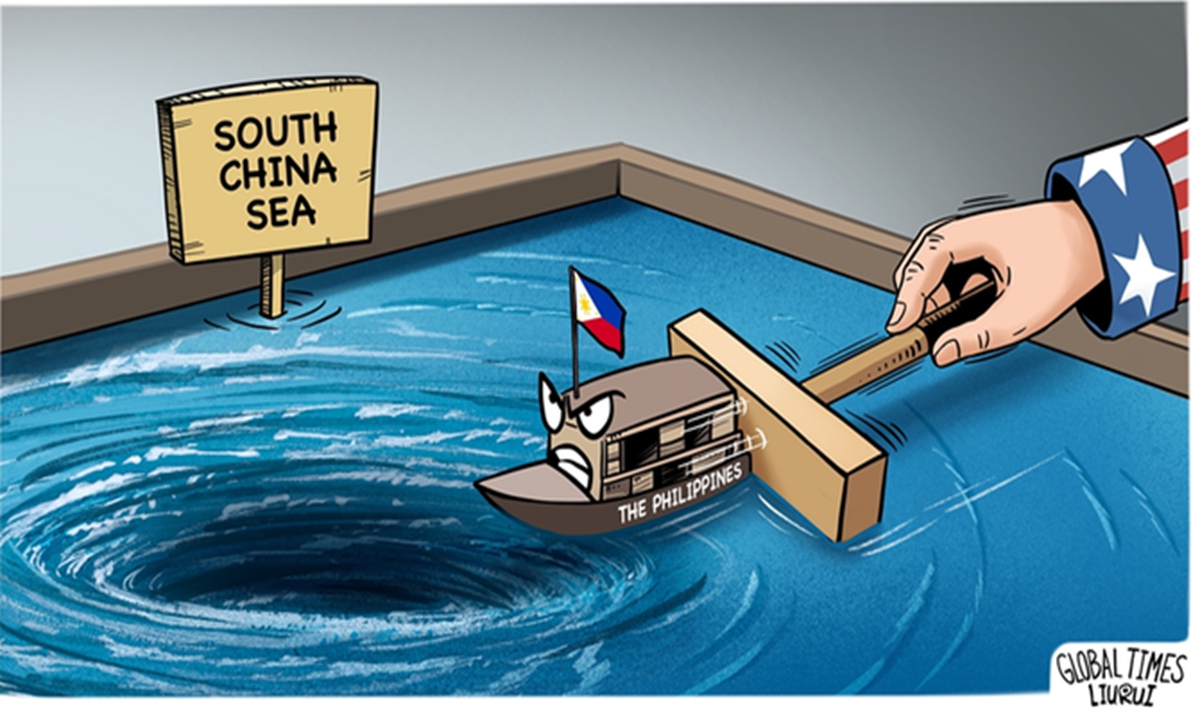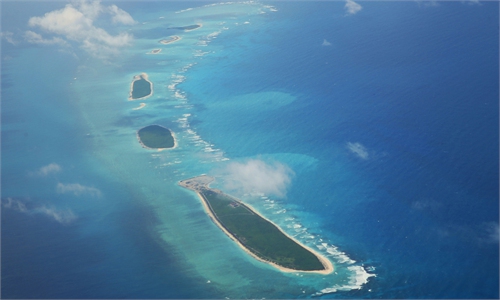
Illustration: Liu Rui/GT
Philippine Ambassador to the US Jose Manuel Romualdez recently made sensational remarks in an interview with Japanese media. He stated that skirmishes between Philippine and Chinese vessels in the South China Sea could spark a major conflict at "any time," and that the South China Sea is the "flashpoint" and "[if] anything happens in our area, it's like the beginning of another war, world war." Not only did the ambassador keep overstating the conflict and drawing fire on himself, he went further and said that "the only way to do that [counter China's' coercive actions'] is to have multilateral countries show force." This is an astonishing remark, which doesn't sound like from an ambassador representing the interests of the Philippines, but rather like from an official in Washington.
What Romualdez stated can be said as a precise alignment with the US statements and moves these days, or even like part of the US actions. The US State Department issued a statement on December 10, hypocritically declaring that it "stands with our Philippine allies" and also mentioned the US-Philippines Mutual Defense Treaty to threaten China. On the other hand, after a long-awaited joint patrol with the Philippines, the US military has done a lot to encourage Manila to"be braver,"and wooed Japan, Australia and other allies to back up the Philippines. In essence, they are putting the Philippines on the fire together.
Romualdez is one of the representative figures of the pro-US faction in the Philippines. He has never been stingy in expressing excessive friendliness toward the US, while at the same time, he often conveys hostility toward China. In the Philippines, the pro-US and anti-China (at least those advocating a tough stance against China) factions are essentially the same group, and this says a lot. The emergence and delineation of this equivalence, as well as the timing of its appearance, are all worth pondering for the people of the Philippines. The US' intention to stir up trouble in the South China Sea is now obvious, and the Philippines is the stick it wields to muddy the waters.
The issue of Ren'ai Jiao has nothing to do with the US, but on several occasions when the Philippines provoked near the region, US warships and aircraft were nearby, even providing intelligence to the Philippines through reconnaissance planes. It's akin to guiding others to commit a crime, instructing them on how to do it, reassuring them not to be afraid, and even handing them the tools for the crime.
The US is well aware of the increasing risk of direct encounters with the Chinese forces at sea, and now that the Philippines is willing to be the "birds that come forward," the US will certainly let it "open the road," then have a winning game behind, which is the most ideal business. Therefore, Washington continues to encourage its allies to incite the Philippine and to make it delirious as best as they can. For this, the US took the US-Philippines Mutual Defense Treaty as bait, however, it has avoided talking about the specific use of this treaty.
When asked about what actions by China would"qualify as an armed attack" stipulated in the Mutual Defense Treaty between the US and the Philippines, the spokesperson for the Pentagon responded vaguely, only stating that they would "focus more on China's behaviors and intent," without emphasizing the commitment to the Philippines.
It is clear that the Philippines and the US are seemingly singing the same tune, but behind this facade lies the exploitation of the Philippines by the US. The current situation is very much like that the US found some "lobbyists" to cajole the Philippines and to yield the benefits.
Within the Philippines, there are already many voices that are becoming wary and even highly opposed to Manila's current South China Sea policy. An article in the Manila Times on December 13 titled"Military, Coast Guard turning PH into world's laughingstock" pointed out bluntly that the Philippines'"madness is driven by the US' need to demonize China and totally cut off relations with the superpower." "The Chinese simply defend what they believe are their territories and humiliatingly shoo away our vessels with water cannons, with the military positioning media to take the most detailed videos of the ignoble event. Have the military turned us into a nation of masochists?"the article said, noting that"the Americans, of course, are secretly laughing at us."Similar voices are constantly emerging from various sectors in the Philippines, which Manila should think about seriously.
China's determination to defend its territorial sovereignty is as solid as a rock. No matter how external forces are provoking or threatening us, we will never back down on our own territory and never be frightened by a vague treaty. China has exercised maximum restraint in the South China Sea, but if repeatedly provoked, China cannot be lenient. For this, the US should weigh up carefully and not get burnt by playing with fire, and the Philippines should not take any chances and not become a victim to be exploited.

